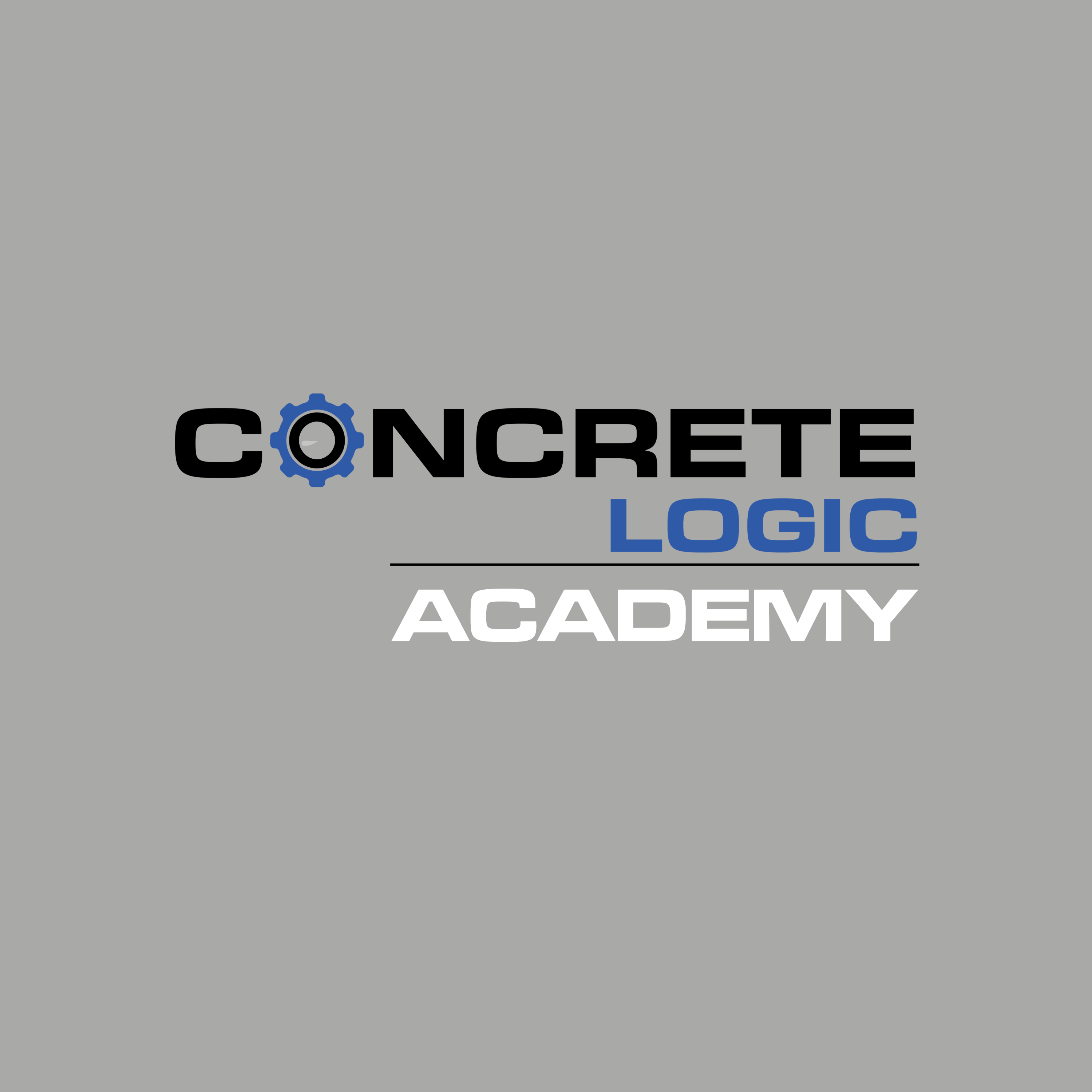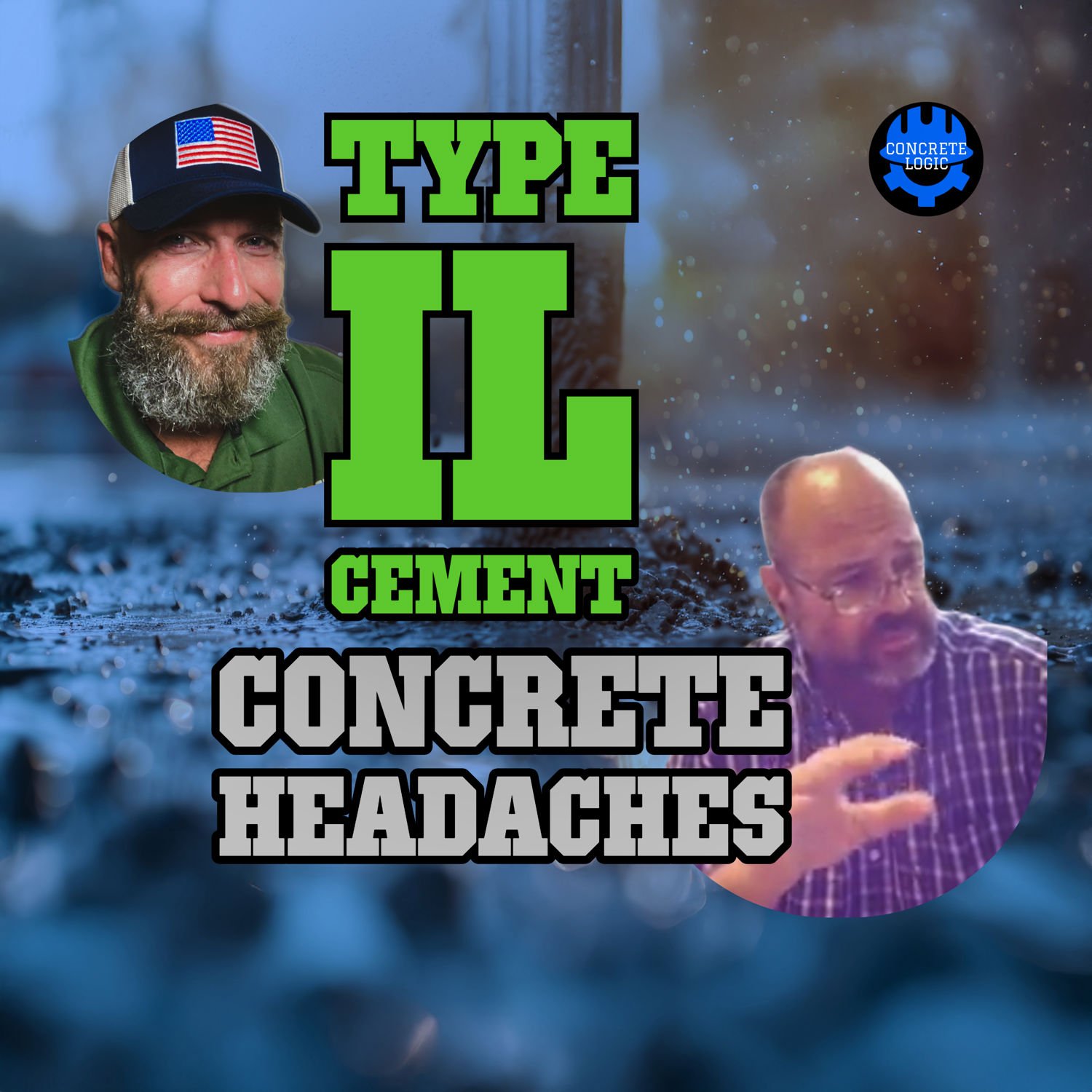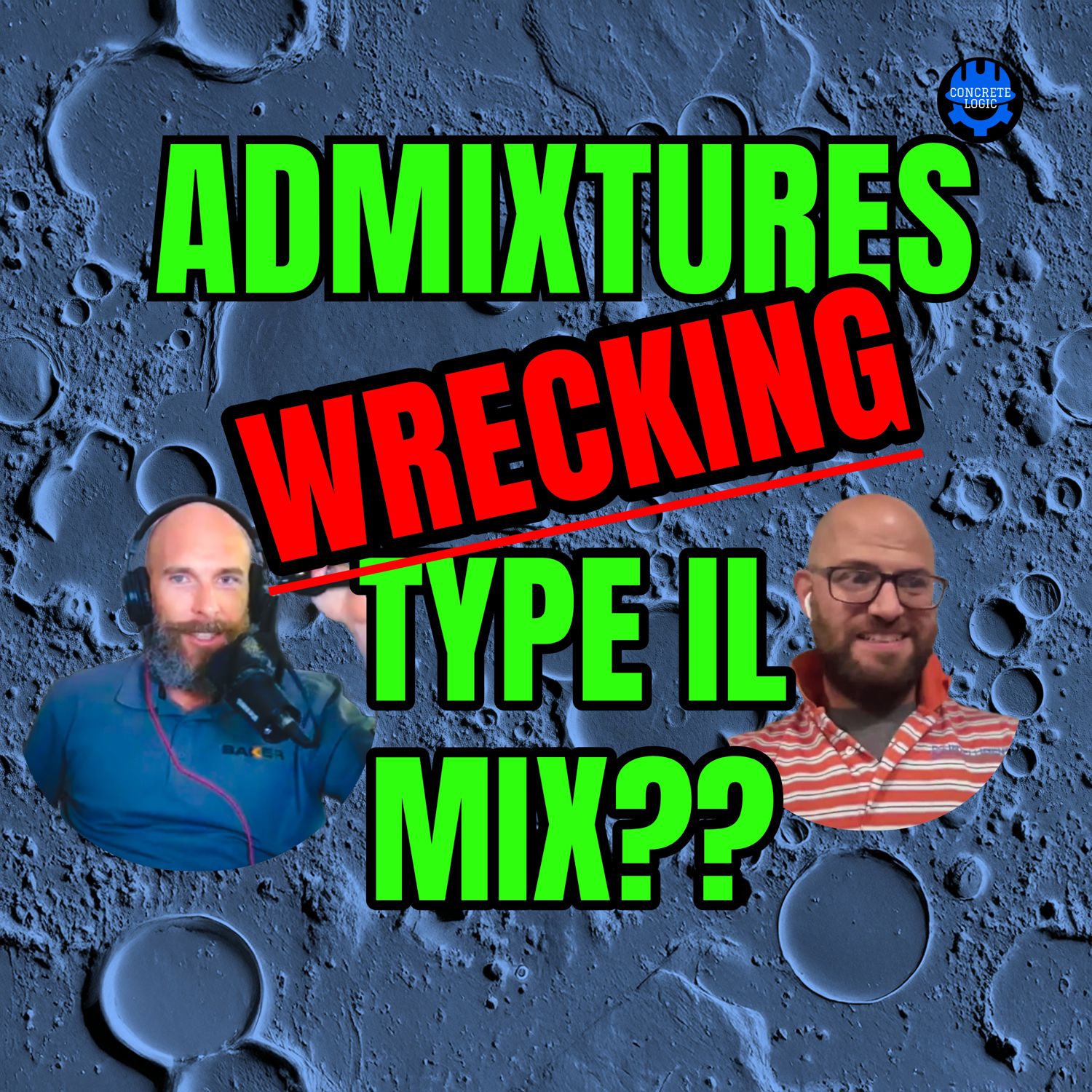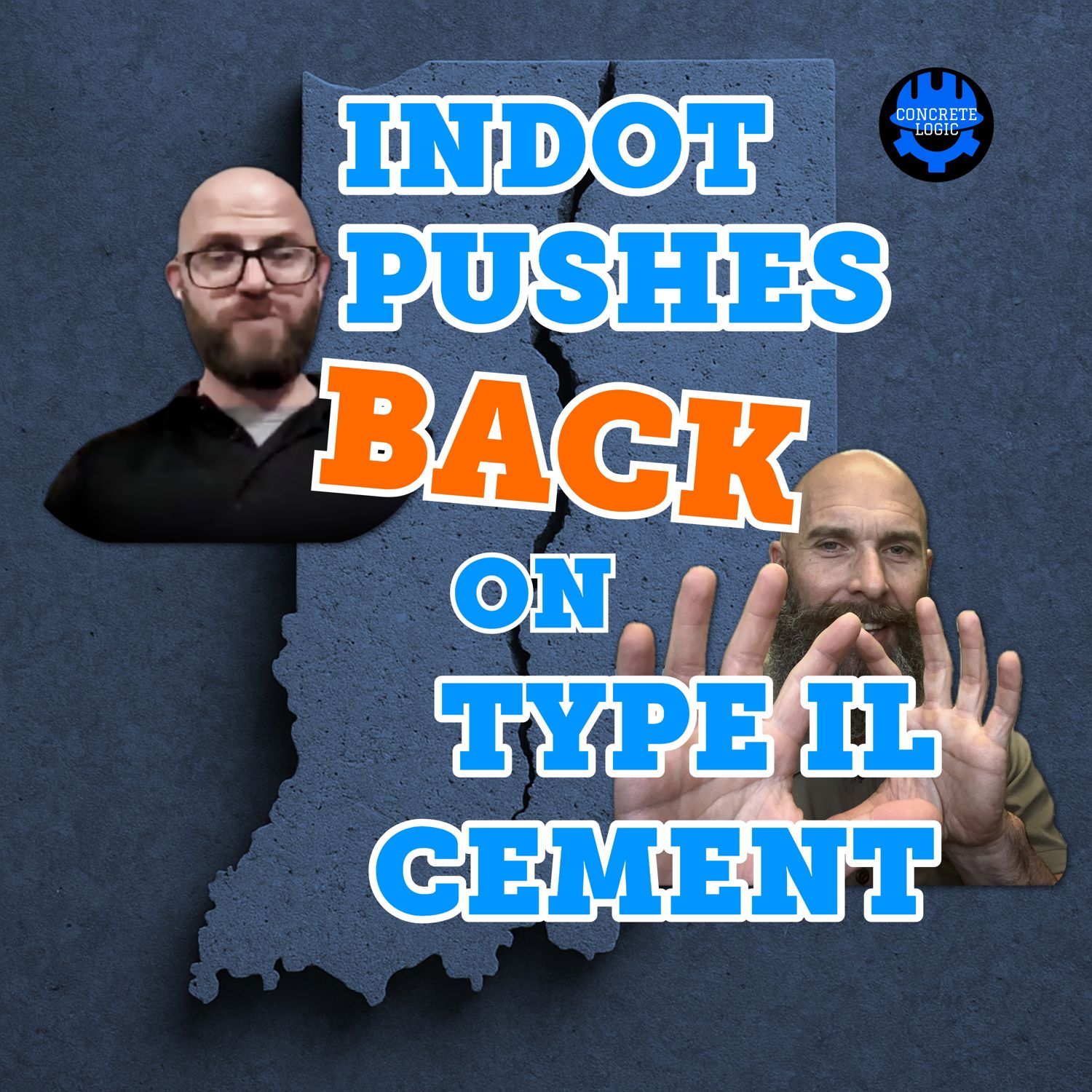EP #120: Will AI Save the Future of Concrete Construction?
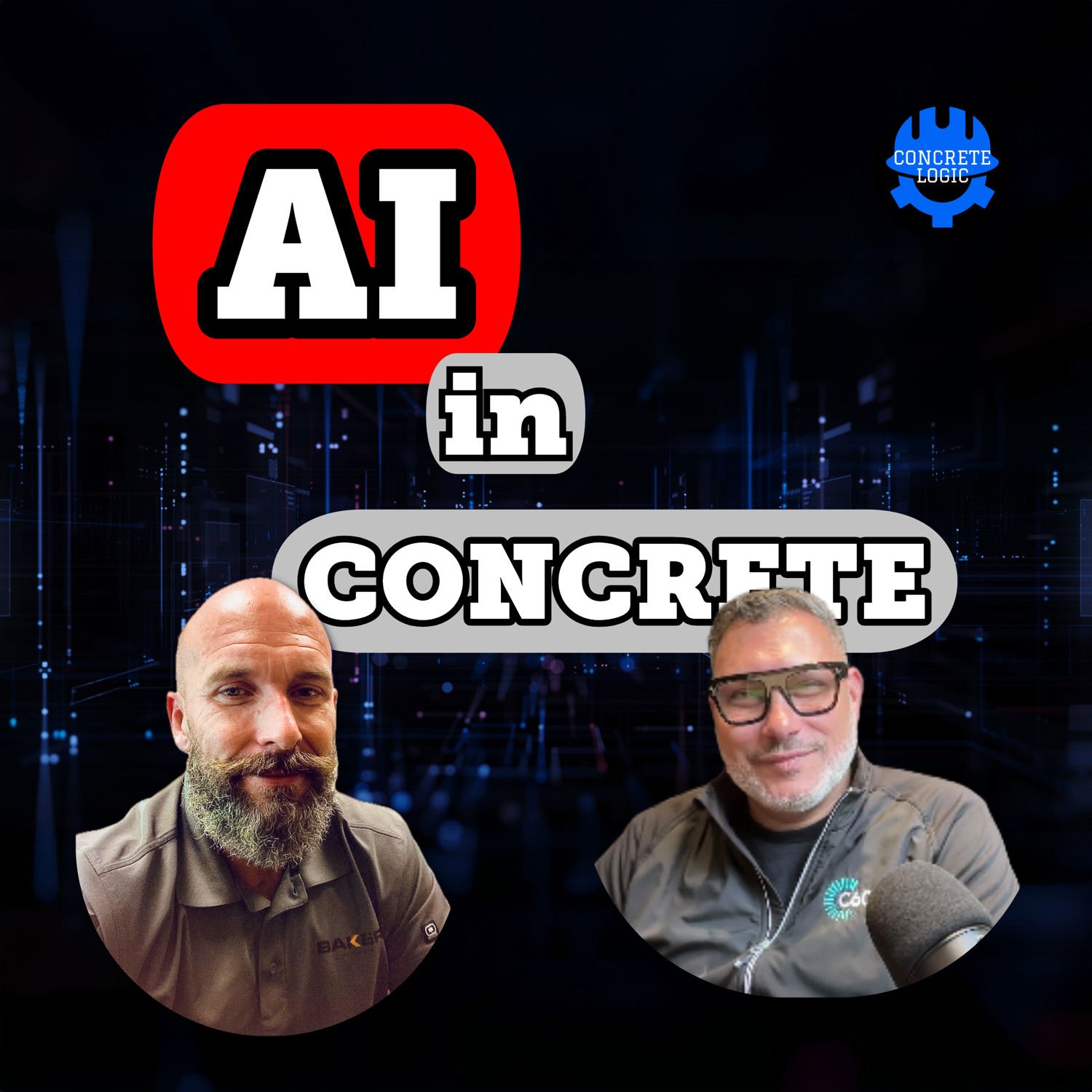
What if AI could be the key to solving the concrete industry’s biggest problem—labor shortages?
In this episode of the Concrete Logic Podcast, Seth Tandett sits down with Ramy Sedra, CEO of C60, to discuss how AI is transforming construction. From boosting productivity to making smarter business decisions, they break down how AI can help, but also why it’s not a one-size-fits-all solution.
Tune in to find out how data, technology, and strategy come together to reshape the future of concrete. Don’t miss this essential conversation for anyone looking to stay ahead in the industry!
What You'll Discover in This Episode:
🔨 Could AI be the key to solving some of the concrete industry's biggest challenges, but not the magic fix we thought?
🛠️ What other tools, beyond AI, are actually necessary to boost productivity in the concrete world?
💬 How can conversational AI change the way we interact with data—and why does it matter for your business?
👷♂️ Can AI help with mix designs, or is there still a critical role for engineers that no machine can replace?
📊 Why is data quality the make-or-break factor in AI’s ability to work effectively in the concrete industry?
🔍 What’s the real power of understanding the context behind the data when applying AI in construction?
📈 How can AI actually predict your business outcomes, and why does it matter for decision-making?
💸 What hidden costs could AI reveal when measuring ROI, and why should you care about lost margins?
CHAPTERS:
00:00 Introduction to the Concrete Industry's Challenges
03:06 The Role of AI in Addressing Labor Shortages
05:59 AI as a Tool for Productivity Improvement
08:49 Transforming Data into Actionable Insights
11:56 Understanding AI's Error Rates and Limitations
15:11 Learning and Adapting AI to Business Needs
18:13 Common Misunderstandings About AI
20:48 Data Quality and Its Importance
24:12 The Case for AI Adoption in Concrete Production
27:01 Quantifying the ROI of AI in the Industry
LISTEN NOW – Every concrete contractor & engineer needs to hear this one!
Guest: Ramy Sedra
Company: C60
Email: ramy.sedra@c60.ai
Website: https://www.c60.ai
=============================
Take Your Knowledge Further – Join Concrete Logic Academy!
Gain exclusive access to expert video courses, live Q&A, and cutting-edge industry insights. Earn Professional Development Hours (PDHs) and elevate your expertise!
Learn More: https://www.concretelogicacademy.com
Support the Podcast – Be Part of the Concrete Revolution!
Donate: https://www.concretelogicpodcast.com
Become a producer & get recognized on our next episode!
=============================
Recommended Resources:
Prediction Machines: https://amzn.to/4lKU1gH
(we may collect a small fee at no cost to you if you buy this item)
=============================
Producer: Jodi Tandett
Music by: Mike Dunton
Instagram: @Mike_Dunton
Stay Connected & Watch More!
Host: Seth Tandett
Email: seth@concretelogicpodcast.com
LinkedIn: https://www.linkedin.com/in/seth-tandett/
YouTube Channel: https://www.youtube.com/@concretelogicpodcast
Podcast Website: https://www.concretelogicpodcast.com
LIKE, SUBSCRIBE, COMMENT & SHARE for more expert concrete insights!
00:33 - Introduction to the Concrete Industry's Challenges
03:39 - The Role of AI in Addressing Labor Shortages
06:32 - AI as a Tool for Productivity Improvement
09:22 - Transforming Data into Actionable Insights
12:29 - Understanding AI's Error Rates and Limitations
15:44 - Learning and Adapting AI to Business Needs
18:46 - Common Misunderstandings About AI
21:21 - Data Quality and Its Importance
24:45 - The Case for AI Adoption in Concrete Production
27:34 - Quantifying the ROI of AI in the Industry LISTEN NOW – Every concrete contractor & engineer needs…
Seth Tandett (00:00)
Welcome to another episode of the Concrete Logic Podcast. And today I have Ramy Sedra from C60 with us. He is the CEO of an AI powered analytics platform, mainly working with ReadyMix folks, so producers. And he's on the podcast today. He had a very interesting stat. I'm going to steal from you, Ramy.
we lose four people and only one's coming in to replace them. So we're looking at how possibly AI can help us with that. we talk about labor shortages all the time in the industry and we,
instead of complaining about it, I think we got to start providing some solutions. Ramy about what you're seeing in the industry right now and then we can kind of venture from there.
Ramy Sedra (00:52)
Seth, thanks a lot for having me on. think you got it right, you summarized it correctly. You know the key stat that keeps my brain kind of whirling about how we help the industry is that you know for every four that are leaving, know one is coming in.
You know, I share the anecdote talking to a producer, you know, at the World of Concrete and they were telling me that, you know, last year they lost 750 years of talent, 750 years of experience talent to retirement. This year they'll lose another 600 or so. And you know, the folks that are coming in,
are folks that are staying two and a half, three years in the industry. Some have two, two and a half years when they come in, they're going from one producer to another. But the people that are retiring have 20, 25 years of experience. So it's not just a question of you're losing this talent pool to retirement.
but it's also how do you replace the knowledge gap that these people represent? And I think that's kind of a macro challenge that the concrete industry has to figure out, right? And so that's certainly one of the things that kind of keeps my brain kind of whirling about.
Seth Tandett (02:02)
Yeah. So AI is going to fix all that and the end. We're done. Right?
Ramy Sedra (02:07)
Wouldn't it be nice if it was that simple?
Seth Tandett (02:10)
Yeah,
I was going to mention, so the concrete industry, you're working mostly with the ready mixed producers, right? Is that okay? So explain, I guess, how you're seeing how AI could possibly help. Let's start with the producers first.
Ramy Sedra (02:28)
Sure. And I guess I'll preface it, Seth, with maybe a couple of things, right? Like a public service announcement. I think the first public service announcement is take what I'm saying with a grain of salt. And the reason I say that is I'm a relative newcomer to the industry, right? I've been at this data and AI and advanced analytics game for the past almost 30 years now, but new to the concrete industry.
Seth Tandett (02:33)
Okay.
Ramy Sedra (02:56)
So, you know, I've used this capability and this technology and other industries and solve problems that look very similar to the ones I'm seeing in concrete, but devil's in the detail, right? And there's always nuances. And so I've, I've been fortunate and surrounded myself with folks that have been in the industry for a very long time, right? And they help keep the
the, the, know, keep my balance, you know, checks and balances, right? So take what I say with a grain of salt. Second is AI is not going to fix everything. Right. I think, you know, lots of marketing machines out there would love you to believe that, but
I'm a bit of a realist and you know, both feet on the ground. So maybe that's why I like the industry so much is it's an OBS industry. So I don't think you know, AI is going to fix everything concrete. I think we need to look at improving productivity on the whole. And, you know, in order to improve productivity on the whole, you need lots of tools. I think AI and data can be one great tool.
you know, in the toolbox. And you know, I think that's a tool that maybe is a little less natural for people to reach out to and to think about. But I'd love to put it in that, in that context. Does that, does that make sense? And then I'm happy to get into like how, how it can help producers. But I think just a level set, and I don't know if you would agree with me, but I think, you know, you know, devil's in the detail.
And number two, you can't solve everything with AI. It's one tool out of many others. Does that make sense to you?
Seth Tandett (04:21)
Yeah,
it does. And, you know, I shared with you before you hit record, I use AI every single day. And I can tell you that it's made me more productive. I would say my employer is getting oodles of productivity out of me now. And just for the simple fact that you can use AI, like you mentioned, I think you were getting to was you can use it as a
a database that you can easily get answers to. if you can share knowledge with AI and based on things that you know, have it in some kind of document form or, you know, I'm making this very simple. But if you can put it somewhere and then have AI go look for something for you, I mean,
Just that fact, just that kind of search function, mean, it saved me so much time. And it can get things done so much quicker. Just having that, is that kind of what you were getting at? I think you were mentioning how we, you know.
Maybe we didn't get to that. We were actually talking about that before we hit record. But I mean, can you expand on that? mean, that just seems like an easy use case for it.
Ramy Sedra (05:38)
Sure.
Sure. It's definitely an easy use case. And I think the first thing is how can you have a conversation with your business? Now imagine.
You know, I think think of like your favorite Disney movie, right? Like if you're I don't know if you have kids and you know, they love they used to love watching Aladdin, right? And make a wish right and Aladdin can grant you any wish and You know, where am I going with this? So it's like imagine your business Has got a genie inside right and and all that knowledge is locked into that genie's mind, right?
But the reality is that that collective knowledge that exists in your business is in a whole bunch of data, right? That data is in your GPS, it's in your batching system, it's in your dispatch, it's in your ERP, it's in a whole bunch of systems. And the world today, when a concrete producer or a professional in our industry wants to ask a question to the business,
What do they need to do? They're gonna go build a dashboard or they're gonna build a report or they're gonna ask one of their colleagues to do an extract of data and they're gonna put that in Excel. And then somebody's gotta go and analyze it and they gotta use their smarts and what they know about the business. They gotta analyze it. And I could go on with this explanation, Seth, for another 20 minutes, but you get the idea is that they're gonna go on and on and on and do this to answer a question.
And you know what the worst part is, is the second they've answered that question, they get another question that's related. And then they're like, geez, I hope that the data I just extracted and put in Excel or built a report on can support the next question that I've got and the one after that. And it's incredibly unproductive. And so what people end up doing is they either rely on their gut, their instinct.
Seth Tandett (07:12)
Right.
Ramy Sedra (07:27)
Or they ask questions once in a while because it's so painful to do this process Or the worst part is they just don't ask the questions and they they do what they think And I think where AI can really play an important role is if you could have a conversation with your business, right? So imagine Everybody's done a Google search, right and you earlier when we were talking you were telling me about chat GPT, right?
And imagine you can go to chat GPT and ask chat GPT questions specifically about your business. And so taking those language models, taking that capability of AI, but turning it inward on your data, your specific data sets.
your understanding of the business, right? Like the context becomes specific to your company. And now all of a sudden you're having a conversation with your business.
That becomes very powerful because now you don't have to build Excel spreadsheets. You don't have to build ad hoc reports. You know, you just type in a question and get an answer. I mean, when you, when you use chat GPT and you ask it for summarize an email or, you know, don't know, you know, compare X to Y, it does it instantly. And so I think that's one of the examples.
that we could bring to the concrete industry to just make people productive, you know, very quickly, right? Because if you think about it, was chatting with one of producers in our network and she was telling me...
You know, about 10 % of her company can build reports and dashboards, right? And like analyze data and do all that fun stuff. but you know, 60, 70, 80 % of her business, right? People have questions. They all know how to do a Google search, right? But they don't know how to build a report.
So if they could talk to the business, just like they did in a Google search, then imagine how you could empower the business to know stuff. It just kind of changes the game in terms of if I knew something, it would influence my decision. And so having that ability to just have a conversation with the business, huge productivity booster.
I don't know if that helps kind of paint the portrait a little bit.
Seth Tandett (09:26)
Yeah.
Yeah, I think so. mean, like I said, I'm very familiar with the product. use it quite a bit. The one thing, just for my personal use, I never really kept a log of it, but what's the rate of error that one should expect from that? Because we've done a couple podcasts on AI previously.
that episode we were talking about how AI can help producers come up with a more sustainable mix design by looking at data that it's fed and then, and I guess giving it parameters on, you know, that, and my question to that guess was, is this gonna replace an engineer? Like an engineer is the one that does the
Ramy Sedra (10:00)
Yeah.
Seth Tandett (10:16)
mixed design now for us. hope they're not all using AI right now. really they just copy and paste specs. that's a, we all know that. anyways, industry joke, Ramy. Anyways, so what can one expect like an error rate? I mean, they're not.
Ramy Sedra (10:18)
Yeah.
Seth Tandett (10:34)
they're not accurate all the time, right? There still has to be a human that kind of looks over the AI shoulder and say, okay, that makes sense.
Ramy Sedra (10:42)
Yeah. Well, it's a great question. And I guess I would think about it this way. And by the way, I'm not suggesting you just go use ChatGPT and load all of your data as a concrete producer into ChatGPT because then you're putting all that data in the public domain. like, yeah, bad idea. Do not upload your mixed designs in ChatGPT.
Seth Tandett (10:57)
Bad idea.
Ramy Sedra (11:01)
And, and, you know, again, I don't want this to be a C 60 infomercial because it's really not, not the point. but you know, we, we've built, you know, something that's purpose built for the industry. And the reason we did that is because
it's hard to use the generic stuff, right? And I know that others are gonna do this as well. And I think it's good because it's the future and it's how we gotta improve productivity. But how do you manage error rate? Because it's gonna depend on the tools you use and it's gonna depend on the prompts you use, right? Which are basically the questions, right?
And so what we found that helps it's is to really create AI agents that are you give it a very or you give it a narrower context. So I'll give you an example. So we have a mix agent, right? Just because you talked about mixed designs. So we have a mix agent and the mix agent.
that the context is very narrow. It's the mixes that you have and it's the, you know, the, the performance of those mixes that you're seeking and right. And so the, the AI learns around those mixed designs in your, in your catalog.
And it'll help you answer questions around well alternative mixes if I want an alternative design to do this similar type of performance right it's going to ask you questions and it's going to it's going to narrow the scope of of the q &a that you're doing with the AI and so the goal is to try and minimize that margin of error. But. You know it's not foolproof.
Right. So I don't think it's going to replace the technical services team. Right. It's not going to replace those, those technical engineers and those experts in our industry. But what it can do is it can give them a little more leverage in the business to support more people.
Right. Because if, if the technical services team has kind of taken that AI agent through the paces and they're comfortable, then it can be a tool for them to be, you know, an interaction tool with the sales team. Right. Hey, I need to price this job or I need to think about this job. What are the alternatives that I have? And you could have a conversation. It could be a tool, a training tool for the, you know, newcomers.
on that technical team. Well, did you think about this? And did you think about that? And how did you come up with this mixed design? How are you solving that problem that the customer's presenting? So it can be a tool. And what it does is it just gives that technical services leader more time. But it's not foolproof. And we kind of bake in this.
feedback loop. So we want producers to kind of rate the answer. think you you know, if you use chat GPT, you'll have seen this right? It tells you chat GPT can make mistakes. And you know, monitor the you know, double check the responses and you know, hey, did this help you? Was it right? Was it wrong? No. So chat GPT does that. And I think that's kind of a best practices you got to get you got to get the feedback from the user. Over time, I think the more
I mean, it's like Google in the early days, right? It's like the more you ask questions, the more it can index the responses, the better it can get at giving you content that's relevant. But you've got to be mindful that it's not perfect. So that's why I say it's a tool. It doesn't replace everybody, but it can. And as you get comfortable, as you've given it more feedback that the answers are accurate,
you know, confidence grows, right? So you get into a better place statistically that you're good. But, you know, we like to think of it as let's start with narrow scopes of problems we could solve, answering mixed questions, you know, generating pricing and estimates automatically.
Et cetera, so those kinds of things. Does that help Seth kind of set the context?
Seth Tandett (14:43)
Yeah. So how long does it take for it to kind of learn a business? I guess, again, I guess it depends on what you're teaching it. Let's stick with mixed designs. is it, put in, say I have, you know, a couple years worth of submittals of mixed designs that I've used in the past. I know they're successful.
Ramy Sedra (14:56)
Sure.
Seth Tandett (15:08)
feed it to AI, and then boom, it's ready to go? is it, how much time does it take for a company to interface with AI till they can feel comfortable that it's providing them accurate information?
Ramy Sedra (15:22)
Well, you can start interacting with it the day you turn it on. Okay. but the reason why you can do that is because when it was built, it was built specifically around the context.
of, and I'm speaking specifically on the mix design agent, right? But the other AI agents that we built is the same idea. So it was built specifically around the context of mixes in concrete, right? So it's seen, you know, thousands and thousands of mixes. It understands the context of those mixes. It understands the types of, you know, questions that you typically get around mixes and mix design. So
You know, the engineering from a product perspective is to build a product in such a way that the AI understands that context very well. So when you load a producer's data set, which is essentially, you know, in this case mixes, then it's going to understand how to interact with those mixes. Now, well, it will be facing for the first time is going to be the types of questions that that unique producer is asking. Right.
And so that will require refinement over time. And that's going to happen as you use it, right? Cause you can't really, I mean, you can, you can do some prediction of that and building the context, right? But it gets better as you use it and as you give it feedback. So you can use it right away.
There's no, there's no limitations to that. It's going to give you answers that are meaningful, but they're going to get more meaningful over time. And how fast that happens is really a function of the types of questions and the frequency of use. And that's going to vary from one business to the next.
Seth Tandett (16:53)
Hehehe.
Just like a new employee, kinda. Yeah.
Ramy Sedra (16:58)
Just like a new employee.
you know, I had a buddy of mine, he was really funny. says, well, you know, it's just like.
it was, terrible, but it's funny at the same time. He's like, well, it's just like, you know, buying AI is like buying a baby. You know, it's like you train it over time. And I said, but are you buying babies? No, no, that's not what I meant. Can't be buying babies, but it's like, it's like a child, right? You're gonna, you're gonna get, you know, your child is coming to the world and it's, it's got some fantastic capabilities and over time it's going to learn.
Seth Tandett (17:15)
Yeah, yeah, yeah.
Ramy Sedra (17:29)
and get better.
Seth Tandett (17:30)
So you've been doing this for a few years with ReadyMix producers and you're learning the concrete industry. What is the most misunderstood about, what's misunderstood the most about AI when you first start talking to customers about AI? Is there something that comes up every time and you're like...
kind of put you on the spot.
Ramy Sedra (17:51)
Yeah, it's a great question.
You know, when I would tell you a couple of things kind of come to mind, I think the first one was, you know, why we weren't talking about AI. And, you know, we were talking to customers a lot about data. And the thing is for us, for AI to be even useful, we had to help producers solve the data problem.
You know, our industry has got full of silos, lots of data silos. So you got a batch system, you got a dispatch, a GPS, a CRM, ERP, and they're all great systems and they're all going through lots of modernization and that's amazing. And the industry needs that. But silos nonetheless. And so even if they're modernized, you just got a more modern silo. And so you've got all your data in lots of different baskets.
And it's great. You can do AI and those individual baskets, but we thought, you know, to really turbocharger producer, you needed to do something more holistic. And so we really focused on solving the data problem for a producer and bringing all their data together. And producers have notoriously dirty data, you know, for, you know, lots of good reasons and solving, you know, like
Cleaning data is a little bit like you go to somebody and say, go clean the ocean. It's like, okay, well, where the heck do I begin? Is it the plastic? Is it the oil spills? What is it that I go clean? So it's figuring out what to target and really understanding, okay, well, what parts of my data do I need cleaner than others? Because those are really gonna make the difference when I predict stuff.
So I think the thing we were getting a lot kind of in the early days is like, well, why aren't you talking about AI more? And we're talking a lot about data. I think the second thing that we were getting is
you know, like.
When you think about AI, it sounds like this very futuristic, it almost sounds like something out of a Star Wars movie, right? I say AI and you're expecting lasers to come flying out of the screen or something. And really, if you...
And I'm, and I'm stealing from one of the, a great book that I really like called prediction machines. And if so, if you're into, you know, that I would recommend that book, but, think if you take the word AI away and you replace it with the word prediction.
And, know, you'll hear me talk a lot about prediction and what we're trying to do is forecast or predict the impact to a business. And if you, if you take that, if you use that word instead of AI, then all of a sudden things become a lot more meaningful. say, well, what, what in your business, Seth, could we predict that would have a meaningful impact on
on how you operate, right? And a meaningful impact that typically, know, I'm a CPA by trade. you know, for me, typical means of dollars, right? So if we could predict better pricing, if we could predict, you know, which customer is gonna hold the truck longer, if we can predict.
you know, what the cost is of holding up that truck, or we could predict, you know, which mixes or which customers are more or less expensive to serve. If we could predict, you know, which plants are gonna over batch, right, or over design mixes, if we can predict these things, right, if we can predict which customer is gonna turn. So if we could predict all of those things, could that help your business?
Right. And so all of a sudden you're not talking about AI anymore. Right. You're talking about things that if you could predict an outcome, like if I knew if I could predict the winning lottery numbers next week, well, geez, you know, that could change my life. Right. So that that's, I would say those are the kind of the two things, you know, the first is like, well, we talked a lot about data and the second is
you know, using the not using the word AI, right? And thinking about it more in terms of prediction. Because then it's like, it's a little bit more relatable.
Seth Tandett (21:27)
Catch. Yeah. So people are getting hung up on the AI, the name AI, and they're thinking, I don't know what they're thinking. It's some futuristic thing and it's going to, you said Star Wars. When I think of AI, I think people might think of Terminator, you know, it's going to take over and we're going to, they're going to be our overlords one day or something.
Ramy Sedra (21:27)
Does that make sense?
Thank
yeah.
Seth Tandett (21:53)
But yeah, it was interesting. You were talking about how dirty data is. This whole exercise that you're doing with your customers, I bet an outcome I would guess would be, we need to start collecting our data in a certain way so this tool is
is does what we need it to do. So it's worth the money that we're spending on it. So what is, is there a certain way that we're collecting, that we need to be collecting data now that so that this thing, AI understands better what we want it to do? I mean, what does that look like?
Ramy Sedra (22:28)
Great question. I love this question. And the reason I love the question is because you know, our industry doesn't have a ton of it and data people running around in the business. mean, and you know, it's like saying, well, you can't drink water until we go clean the ocean.
Right? Well, that's going to be, you know, you're going to die of thirst before you ever, you ever finished cleaning the ocean. So what's the alternative? The alternative is let's go to where the data is. Let's connect to the data the way it is. And if, if we understand the industry, let's invest in understanding, you know, the,
the typical abnormalities that we would expect to find in concrete data. And that's one of the advantages of surrounding yourself with people that really know and understand the industry is by understanding those abnormalities. Well, you can train, right? We use AI in our data quality, right? And so we eating our own dog food. And so by doing that, we can go and, you know, apply algorithms and rules.
that are essentially going to help us accelerate that data cleaning. And the goal like we don't build a PNL, right? We're not building an accounting system where everything's got a balance to the penny. What we're trying to do is tell you directionally where your business is over underperforming and why and what you got to change. Now whether the opportunity is $1,000, or it's 1001 or it's 800, it's an important opportunity to go fix.
the fact that it's not to the penny accurate doesn't matter. You just want to know am I heading north or am I heading south? And so what we've done is we've invested in kind of building that out because we believed that again, we can't wait for a producer to use their data in the perfect way. I think that's a...
a great ambition to have greater data, but it takes time, takes a lot of investment, takes a lot of coaching and educating people on how to use systems. And, you know, we've also got this amazing thing happening in the industry where a lot of the big sort of ERP producers, you know, that build batching systems and dispatch systems in our industry, those systems are upgrading now to the cloud and they're modernizing how producers work.
And so they're building better frameworks for people to manage their data. And that's great. We're going to, we're going to be the beneficiary of that, but you shouldn't have to wait until that happens to be able to take advantage of your data. Right. So we really want it to solve that problem upfront by connecting into the data, automating all of that data quality, removing, you know, as much of the noise as we possibly can from that, from that data.
doesn't have to be perfect has to be just, you know, I'm going to geek out on you a little bit, but it has to just be statistically relevant, right, that you can use it in that prediction, right? So doesn't have to be 100 % has to be, you know, good enough, right. And so that's, that's what we've done, because otherwise,
you know, for producers, it becomes this daunting task of like, geez, you know, this is here's another, you know, digital technology promise that I can never actually materialize in my business because like, well, I'm never going to have perfect data. Right. So you don't, you don't need it.
Seth Tandett (25:38)
Yeah. So if a producer, you know, they're like, Hey, what we're doing is working. That's a, that's a thing you'll hear in the construction industry. Hey, this is working. Why, why, why upend everything and wedge in AI? Why, why do that?
Ramy Sedra (25:53)
Um, there was a couple of reasons I could think of. said, said that, know, the first is like most producers, you know, or running spreadsheets to manage and analyze their business. Right. And,
I think they inherently or instinctively know what they need to monitor in their business. mean, especially people have been doing this for generations. We're not going to teach them the concrete business. But I guess the question becomes,
you know, could you do it better? Could you be more productive? Right? If instead of relying on averages, you know, average delivery times or average, you know, hourly costs, or, if you could, you could rely on, you know, precision, you know, how could that help you? Right? If you could know now,
If you are profitable today or yesterday and whether you're going to be profitable tomorrow and you knew what you could change to be more profitable tomorrow, could that help you? The time you spend doing those spreadsheets that you're doing in Excel and applying the family recipe of how to analyze the business, if...
you know, if there was a more specific way to do that or a faster way to do that, or a way that you didn't have to do it, but it was done for you, would that help you? Right. And got to think about it in terms of like, if, the business is going by faster, right, and now your competitors that could be bigger or smaller, right, are using this and
It's making them more productive and more competitive and that translates to, you know, they could get better pricing or they can generate better margins or, you know, they're giving better service or they're partnering, you know, in a more value added way with their customers. Is that a threat to you or could that be a threat to you?
Right. So I'm not going to sit here and say, well, this is why you should. But I think there's some questions you should be asking yourself as a producer. So whether this could help. Right. And whether there's opportunity, you know, and if you don't think you're leaving money on the table, if you don't think that you could improve performance, if you think that the recipe you've applied for generations is the right one and it's, you know, it shouldn't change.
then by all means don't look at the innovation. Maybe it's not for you. So I would just invite people to think about those things and ask themselves that question. It's a little bit like the microwave. I I have a microwave in my kitchen. Once upon a time, I didn't have a microwave. When I grew up, we didn't have a microwave and we didn't use a microwave.
kind of like the convenience that it provides.
Seth Tandett (28:25)
Yeah, yeah,
right. Well, yeah, well, you've been doing this for a few years, so you can probably share some data with the ones that have adopted the technology and share. You know, it's kind of one of those things you don't know what you don't know. So if you can point to, this is how we used it with this customer and this is what they saw, because bottom line is
They want to see a return on their investment. I always ask, if I spend X, what's my Y? You got to me the Y. But yeah, it's interesting. And also you can think the more we use AI, the more data centers we got to build. So that's good. It's a crazy world out there as far as that.
Ramy Sedra (28:59)
Yeah.
Yeah.
Seth Tandett (29:13)
goes.
But I think we're getting towards the end here, Ramy. there something else you want to share with the folks before we go?
Ramy Sedra (29:19)
Well, let me share one thing. So, you know, because you asked about return on investment and I think that's a one thing.
you know, that's really important. at least it's always at the center of my, my mind, you know, being a CPA is one of the things that we, we uncovered last year. So with our class of 24, right? The customers that were on our platform last year is on average, they were leaking about $7 a yard in margin. So, so we could quantify for them.
you know, the size of the problem. so that's, you know, quantifying the inefficiencies in the business, right, and pinpointing the inefficiencies in the business. And as a result, you know, that gives them the opportunity to recover some of that $7. Now, nobody's going out Seth and recovering $7 a yard. I mean, that would be that would be too good, right? But, you know, whether they're recovering
you know, 50 cents, $1, $2 on that on that lost margin. And think about that this is margin that they intended to make. Right. But they're otherwise losing because of just inefficiencies in the business that they're not able to see, because they don't have the granularity of the data, they can't analyze it in real time, you know, they can't they can't get that at the tip of their fingers. And so
you know, you ask, well, why would why would you do this? You know, what's the return? I would say, you know, how much like I would ask the question, right? How much how much margin are you leaving on the table? Do you know? And, you know, what could you do about it? So, you know, I'll leave you with those questions, but some something for producers to think about.
Seth Tandett (30:57)
Yeah, that's a point. When I heard $7, I was thinking, that sounds like a discount for the concrete contractor. Ramy, I appreciate you coming on the show today. If folks want to reach out to you, what's the best way? What's your preferred way?
Ramy Sedra (31:13)
way is ramy.sedra@c60.ai
Seth Tandett (31:16)
Okay, yeah, and we'll put that in the show notes. Make sure you check out the show notes, not just for Ramy's contact information, but how you can support the show. So make sure you get on there and check out the show notes. Ramy, thank you for coming on the show today. And yes, sir, and folks, until next time, let's keep it concrete.
Ramy Sedra (31:30)
Appreciate it.

CEO / Dad / Food Lover
Ramy Sedra, the CEO of C60, an AI-powered analytics platform transforming the ready-mix concrete industry. Born to immigrant parents who came to Canada in the 1960s in search of a better future, Ramy has built a career rooted in innovation, grit, and impact. He’s led high-growth teams at PwC and McKinsey, launched and sold his own analytics company, and played an active role in shaping Canada’s AI ecosystem through initiatives like NEXT Canada and SCALE.AI.
But beyond the tech and strategy, Ramy’s also passionate about cooking and bringing people together. He’s a dedicated home chef who loves experimenting with recipes and entertaining friends over a great meal—a reminder that leadership isn’t just about data and decisions, but also about heart and hospitality.














